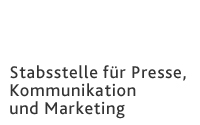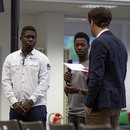Executive Department for
Press, Communication and Marketing
Adolf-Reichwein-Straße 2a Gebäude AVZ (Gebäudeteil AR-NA) 57068 Siegen
Phone: +49 (0)271/740-4915 Fax.: +49 (0)271/740-4911 E-Mail: presse@uni-siegen.de
Form Refugee to Skilled Worker?
The Research College of the University of Siegen discussed the potential migration holds for the regional labor market during the FoKoS week.
Amadou Diallo and Kommy Amegan made it. The two young men came as refugees from Guinea and Togo to Germany. After training at the vocational training center (bbz) and several internships with regional employers, they gained a foothold in the Siegerländer labor market. For now, at least. One of the two young men was able to start training with a construction company in September, the other has a training position at a metal company in prospect. The two made a reported about their development at the theme afternoon "Skilled labor & Refugee", which was organized by the Institute of Advanced Studies "ForschungsKollegSiegen" (FoKoS) in the context of the FoKoS week (23-27 October).
The theme is central to the future of the region, emphasized FoKoS-Postdoc Stefan Metzger, who moderated the podium discussion. "The South Westphalian region is clearly shaped by the consequences of demographic change and the emigration of young people," says Metzger. Even today, many apprenticeships are vacant and workers are becoming increasingly scarce. According to a 2015 FoKoS study, by 2030 the number of people in employment in the Siegen-Wittgenstein district alone could decline around 20 percent.
However, no one could count on more than 1.1 million refugees coming to Germany by the end of 2016, even in rural regions such as the Siegerland. "They are not just looking for asylum, they want to shape their lives. Work is an important prerequisite for this, "Metzger explained. Even if only about 13 percent of the refugees who had previously come to Germany had a university degree, about two thirds still want to acquire a university or vocational qualification. Against this background, he raised the question of how the refugees also represent an opportunity for generating manpower in rural areas.
Metzger first put this question to Klaus Gräbener, Chief Executive of the Chamber of Industry and Commerce (IHK) Siegen. On the initiative of the IHK the vocational preparation measure for refugees had been implemented, in which also Diallo and Amegan participated. "The reason for this measure was of course, that the shortage of skilled labor poses great challenges for the German economy and, in particular, the companies in our region," said Gräbener. But also because the inclusion and integration of refugees is a socio-political task that the economy must face. The entrepreneurs of the region had made money available for the project very quickly. "But until the institutional hurdles are overcome and the work can start, it takes time," said Gräbener. A point that the two refugees in the preliminary talk called their biggest problem: the waiting. To be forced into inactivity, to live in uncertainty, always hoping for a message from the immigration office.
The vocational preparation for refugees is now running successfully. A good 50 percent of the participants could be placed in a job. That's a good rate, says Gräbener. There are measures for German nationals which have a smaller success rate. "It is important to enable people to qualify for employment. That's the same with a person from Togo as with someone from Oelgershausen, "said the IHK chief executive. In order to not have a sudden lack of skilled persons, one must become active. "Vocational preparation for refugees is not just a signal."
Dr. Andreas Neumann of the Arbeiterwohlfahrt (AWO) district association Siegen-Wittgenstein / Olpe supported this view. As a welfare organization, it does not only integrate refugees, but it also acts as an employer on the market. "And that in an industry which experiences growing demand for employees, for example in the nursing sector." There, they rely on immigration. "Whereby language development in this field of work is once again of particular importance."
Berivan Aymaz, member of the NRW Landtag of the Green Party and spokeswoman for integration policy, refugee policy and international affairs / one world, emphasized that refugees principally do not have to achieve their place in society. "People are here to get protection." Nevertheless, integration works above all through vocation and work. "Through work, people find access to society." Dr. Wolf-D. Bukov agreed. On the one hand, he described how too much bureaucracy complicates labor market integration. Unfortunately, this has changed little in recent years and decades. On the other hand, he also highlighted the opportunities of the current situation. Expanding the opportunities and resources in rural areas, would not only help the refugees, but also the long-established residents, and thus the entire region.


